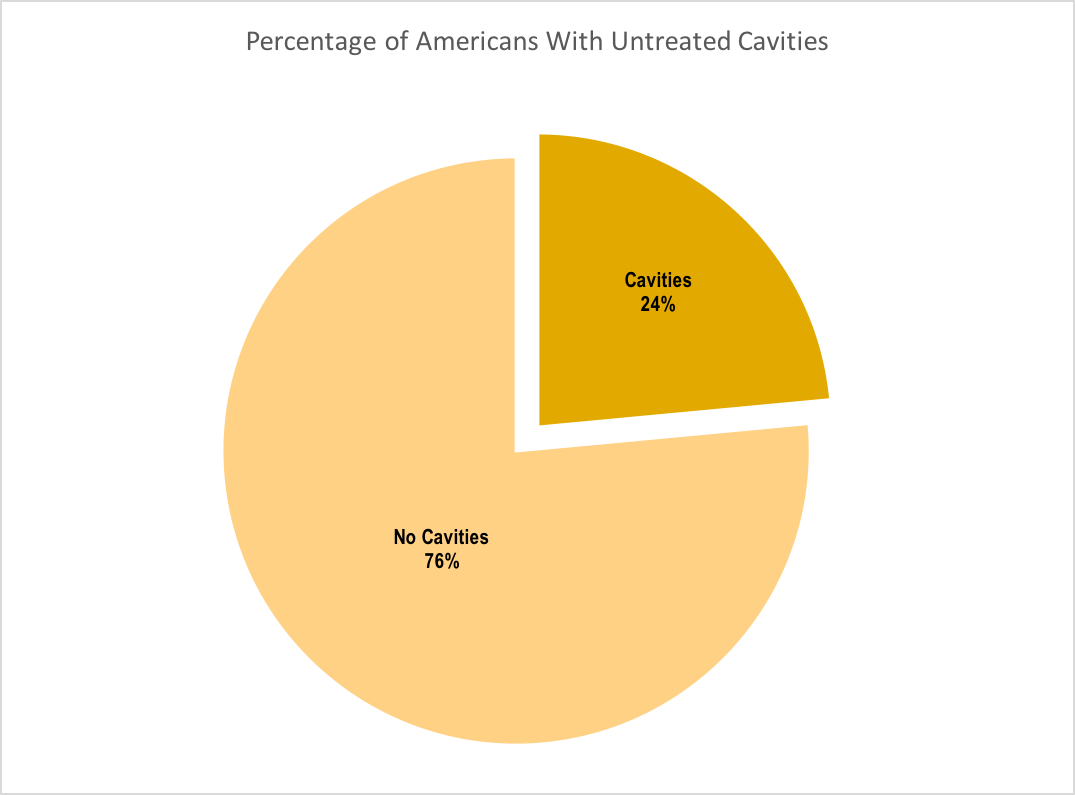Tooth Brushing Tips for Adults
As an adult you likely have already mastered the art of brushing your teeth. However, it’s never to late to learn a few tips and tricks to improve your tooth brushing game and improve your oral health.
Did you know that in the United States, roughly 31% of the adult population have untreated cavities? That’s almost 75 million adults in the United States who have cavities that haven’t been treated. If these cavities remain untreated, the individual may suffer incredible pain, infection, and even tooth loss just because more than likely, they didn’t brush their teeth effectively or often enough.

If that statistic wasn’t enough, only 60% of adults have scheduled dentists visits on an regular basis. That means that 4 out of 10 adults won’t have their teeth checked and have a higher risk of tooth decay, cavities, gingivitis, and halitosis that those that do go to the dentist.
What Are Cavities?
According to the Mayo Clinic, cavities are tiny holes in your teeth that happen due to permanent damage of the hard surfaced-enamel. Cavities and tooth decay are one of the world’s leading health problems. If cavities aren’t treated, they get bigger and bigger and cause tooth aches, headaches, infections, and eventually tooth loss.
Cavities happen due to tooth decay in the following 3 steps:
- Plaque develops
- Dental plaque happens when you eat. Especially foods that are starchy or high in sugar, plaque is a clear sticky substance that binds to the teeth and stay there if you don’t clean your teeth well. The easiest way to clean most of your teeth is by brushing. If the plaque isn’t removed, it turns in to tartar which is a hard substance and very difficult to remove without going to the dentist.
- Plaque grows
- If plaque isn’t removed, it starts eating away at the hard enamel of your tooth. Eventually it will cause tiny holes in the enamel. The enamel is your tooth’s first layer of defense. Kind of like your car’s clear coat is it’s first defense against the elements to protect the paint, the enamel in your mouth is your shield protecting your actual tooth material called dentin. When the enamel is gone and the bacteria starts attacking the dentin, it will start causing tooth pain since the dentin is directly connected to the nerves in your mouth.
- Tooth destruction
- If gone unchecked, the bacteria will continue to destroy your dentin and move on to the inner tooth called the pulp. This is like your car’s clear coat being taken away and the paint being stripped. The elements will eventually rust the car and destroy the metal. Once the bacteria starts attacking the tooth pulp, the tooth will become inflamed causing a lot of tooth and mouth discomfort and pain.
Things that encourage cavities
Cavities is what happens when you don’t brush your teeth. The below activities all encourage cavities and can be remedied by brushing.
- Certain Foods and Drinks
- Foods and beverages that stick to your teeth for a long time are more damaging than those that can more easily be washed away by saliva. Foods high in sugar are especially bad for teeth, like soda, cookies, cakes, candies, honey, and milk are especially bad.
- Eating Right Before Bed
- Going to sleep without brushing your teeth is probably a bad idea. If you eat foods and go to sleep the food will eventually start attacking your teeth and increasing your odds of tooth decay.
- Improper Brushing
- Improper brushing technique or not brushing long enough can certainly lead to cavities and poor oral health. Remember to brush for 2 minutes at a time, 2-3 times a day. Start in the middle of your mouth and gently brush from tooth to tooth to one side of your mouth (top and bottom), then the other side of your mouth until all teeth are scrubbed clean. Don’t forget to get the gums too!
- Not Using Fluoride
- Fluoride is a naturally occurring chemical that is added to most city water supplies. It has been found to help eliminate plaque and promote oral health. When you brush your teeth, make sure to use a toothpaste that has fluoride in case your water supply doesn’t. Check out this informational video from the American Dental Association on Fluoride:
- Dry Mouth
- Dry mouth encourages cavities because it means your mouth is running empty on saliva. If there’s no saliva in your mouth you won’t be able to wash away the dirt and grim that causes cavities. So, make sure to drink plenty of water throughout the day and stay hydrated!
